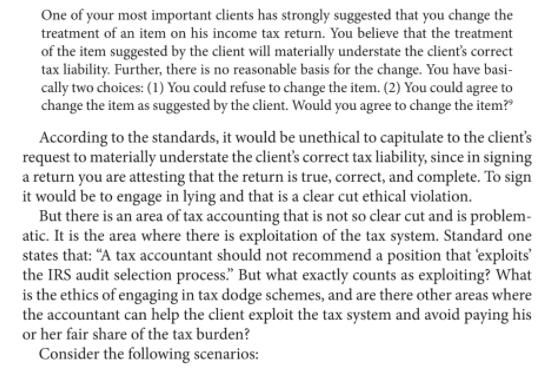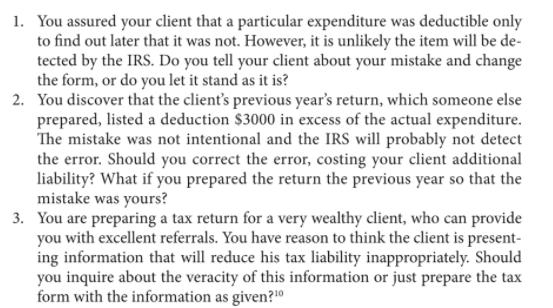Answered step by step
Verified Expert Solution
Question
1 Approved Answer
One of your most important clients has strongly suggested that you change the treatment of an item on his income tax return. You believe


One of your most important clients has strongly suggested that you change the treatment of an item on his income tax return. You believe that the treatment of the item suggested by the client will materially understate the client's correct tax liability. Further, there is no reasonable basis for the change. You have basi- cally two choices: (1) You could refuse to change the item. (2) You could agree to change the item as suggested by the client. Would you agree to change the item? According to the standards, it would be unethical to capitulate to the client's request to materially understate the client's correct tax liability, since in signing a return you are attesting that the return is true, correct, and complete. To sign it would be to engage in lying and that is a clear cut ethical violation. But there is an area of tax accounting that is not so clear cut and is problem- atic. It is the area where there is exploitation of the tax system. Standard one states that: "A tax accountant should not recommend a position that 'exploits' the IRS audit selection process." But what exactly counts as exploiting? What is the ethics of engaging in tax dodge schemes, and are there other areas where the accountant can help the client exploit the tax system and avoid paying his or her fair share of the tax burden? Consider the following scenarios: 1. You assured your client that a particular expenditure was deductible only to find out later that it was not. However, it is unlikely the item will be de- tected by the IRS. Do you tell your client about your mistake and change the form, or do you let it stand as it is? 2. You discover that the client's previous year's return, which someone else prepared, listed a deduction $3000 in excess of the actual expenditure. The mistake was not intentional and the IRS will probably not detect the error. Should you correct the error, costing your client additional liability? What if you prepared the return the previous year so that the mistake was yours? 3. You are preparing a tax return for a very wealthy client, who can provide you with excellent referrals. You have reason to think the client is present- ing information that will reduce his tax liability inappropriately. Should you inquire about the veracity of this information or just prepare the tax form with the information as given?10
Step by Step Solution
★★★★★
3.43 Rating (169 Votes )
There are 3 Steps involved in it
Step: 1
As per the rules and guidelines a successor of a business entity a corporation partnership or sole proprietorship and a predecessor of a business entity a corporation partnership or sole proprietorshi...
Get Instant Access to Expert-Tailored Solutions
See step-by-step solutions with expert insights and AI powered tools for academic success
Step: 2

Step: 3

Ace Your Homework with AI
Get the answers you need in no time with our AI-driven, step-by-step assistance
Get Started


